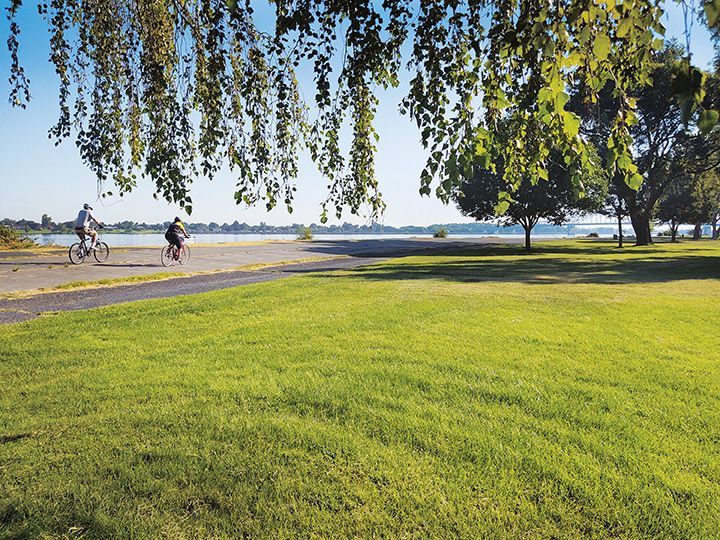‘Sustainable Tri-Cities,’ an alliance for a livable sustainable community, is a citizen-centered sustainable development organization. We have been holding community forums and providing positive input to our community and business leaders for almost 20 years.
About ALSC
The first thing we are is an alliance. Our membership is composed of individuals from smaller, more focused community groups, like Audubon, Bike Tri-Cities, Tapteal Greenway, and Friends of Badger Mountain, among others, who work to preserve the livability value of our local designed and natural landscapes (and you can join us, too!). What unites us is the vision of sustainability, which, simply put, is that if you like something, you should utilize it and treat it well so that your kids and their kids can enjoy it too.
That’s it. That’s sustainability. It’s living and acting with a long view. The Pacific Northwest Native Americans here who preceded us cast the consequences of their actions out seven generations ago. We think that’s a good start, but modern planning tools allow us to go even further,
and broader.
‘‘What unites us is the vision of Sustainability, which, simply put, is that if you like something, you should utilize it and treat it so that your kids and their kids can enjoy it, too.’’
– Smarter urban growth
When we look at proposed land use actions like expanding a city’s urban growth boundary, we ask what the impacts will be down the road, and if that’s the most sustainable use of the land at this time. We look at possible impacts on special populations of people and the natural world around us and ask, “Who’s diminished? What’s lost?”
But sustainable development is not just about preservation, it’s also about smart growth, and business practices that benefit the community and environment as well as the business. Sustainability shows businesses how to make a minimum negative impact in their operations, and how to ensure that their health is the community’s health. We have some great local examples to show you.
Climate Change
Our local Richland Field Office of the Hanford Site was the first one of its kind in the U.S. government to do a carbon footprint analysis of its operations in 2009. Bravo! If you’re concerned about global climate change (and you should be), it’s reassuring that our major employer here is monitoring and improving their operations every year in this regard, and we hope they continue. This is something the ALSC wants to bring to the entire Tri-Cities. Climate change will continue to affect us, and the sooner we pay attention and respond to it, the better we can mitigate its impacts. So, why is there no Tri-Cities-wide, local, government-led effort doing this? Join us and help make effective, citizen-centered engagement with climate change a reality.
Community involvement
Sustainability is not only about depth in time, it is also about breadth. If we are going to preserve what we love about this place for our descendants, then we must plan and act so as to foresee the important consequences to all who will be affected. That means getting input from a wide variety of those who live here now. It means involving as much of the community as we can in local decision making. This is called citizen involvement, and sustainability depends on it, because we decide and plan best when we include as many viewpoints of those affected as possible.
Columbia Rivershore for all?
Recent regional planning hasn’t been very good at involving the community. Do you enjoy all of the parkland along the Columbia River in our community? Do you know it’s there because the federal government, administered through the Corps of Engineers, owns that land? The cities just lease it. They are limited in what they can do with it, which is why it is kept for public natural recreation.
But major business interests here in the Tri-Cities have submitted to congress through our congressperson a reconveyance of much of that land, which transfers ownership of it to the local cities and counties. This will be attached to a forthcoming ‘must pass’ spending bill this next year. If it does so, the cities and counties will now own the Rivershore around us all. What do you think they will do with it? Build condos and riverside docks and restaurants? It is somewhat telling that when a major business organization here went out to promote ‘reconveyance’ in the last few years, they did so to every real estate organization, but no environmental ones. That is not sustainability.
We in ‘Sustainable Tri-Cities’ are now trying to redress this lack of foresight. We have spoken to our congressperson. We have engaged the Tribes, who are also affected by this, because their ancestral lands and burials were often along the river. In their treaty, they were guaranteed rights to that land in perpetuity. But those rights were guaranteed by the U.S. Government, not the new owners under reconveyance. Abridging these now, in this legalistic way, would not be sustainable development, which brings all affected into such decision making.
Work with us
We have work to do, because no cost-benefit analyses and no comprehensive vetted plans assessed by Planning and Parks Commissions were done in this case, giving residents their say and their insights.
If you are as concerned about the future health and well-being of our community as we are, then please take a look at our website, or send an email to alscboard@alsctc.org and join in this quest for a future we can all thrive in.
Photo courtesy of Jenni Heerink

